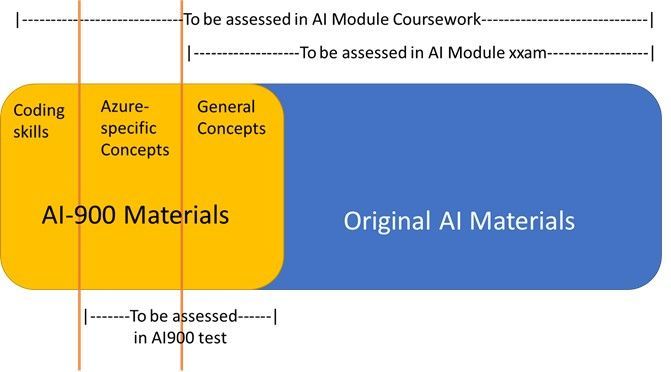This article is contributed. See the original author and article here.
Guest blog by Amir Pourabdollah PhD, MSc, Meng, BEng. Senior Lecturer & AI Course Leader, Department of Computer Science, Nottingham Trent University and Microsoft Learn Educator Ambassador


I live in Nottingham, UK with my family: My wife, my son who is 18 and my daughter who is 11. I am from an Iranian background that live in the UK from 2003 when I started my MSc then PhD in Computer Science at the University of Nottingham (UoN). After graduation, I became a research fellow in the same university and worked in this position for 8 years. Then I moved to Nottingham Trent University (NTU) and became a senior lecturer at the Department of Computer Science. This all means that by now, I have been in Nottingham “Universities” for 18 years (i.e., as old as son!).
OK, after this short intro, what are all these have to do with being a “Microsoft Learn Educator Ambassador”?
Well, it starts from the last year, just in the middle of COVID lock down, that I [unnecessarily!] taking Artificial Intelligence module leadership. Although I had research background in AI and have been in the AI community and research groups, teaching AI was relatively new for me. By the way, I took leadership for the 3rd year AI module, and recently became “Computer Science – AI” Course Leader. This course is newly proposed and approved following marketing research at NTU, and will hopefully get the first students in 2022-23 academic year. Moreover, we run AI modules for MSc Computer Science and MSc Data Analytics students, and finally for Degree Apprenticeship courses. (imagine how all these arrangements took place in COVID Lockdown)
Sorry, let’s comeback… eventually at the same time of taking all of those responsibilities, I was told that Microsoft and NTU are teamed up to expand collaborations, not only for infrastructure but also for computer science education. Particularly there have been some communications between our head of department (Prof Ahmad Lotfi) and Clare Riley (HE engagement manager for Microsoft UK) that Microsoft can support free materials and certification of “Azure AI Fundamental” for a limited number of students and staff.
This was a start of making some changes to the AI module and reach to a win-win situation: For students to learn more up-to-date and practical materials that what they’d have supposed to learn, and get a free certificate by the time they graduate from NTU! For us as academics, it was a risk of doing this as a pilot program that if runs successfully can showcase a good industrial collaboration and will be continued more widely. Ahmad asked me if I can lead this pilot program, and the answer was [again unnecessarily] yes!
Leveraging Microsoft Azure-AI Fundamental
How did I incorporate the MS Learn for Educators teaching materials into the existing materials? What about assessment? Timing?… These were questions to be answered. I was myself new to Azure-AI so all of these had to be a learning-teaching experience.
The decision to make the changes was done in November 2020. By that time, no substantial change would have been allowed for a module.
The first thing I did was asking my students: Do you want to get this certificate or want me to leave it for the next year students?! Take it or leave it! If you take it, then we need to work together for good: be tolerant about unexpected changes and uncertainties. I asked them to expect changes from the start of term 2 (January 2021). I received positive messages, although in online teaching, understanding the actual views were not easy, and to be honest I still do not have a strong feeling what my students think about this program – let’s be optimistic for now!
I planned my new year holidays to learn Azure-AI myself, and plan for the changes in materials and assessments. The module revamping challenge was that I needed to draw a line between the materials that are being assessed in the module exam/coursework and those which are just needed for taking the MS test. On the other hand, there are something that are covered in the Microsoft materials that are not being asked in the Microsoft test (such as coding). I followed an assessment pattern like this:

I will write later how did I incorporate the AI-900 into assessment elements (exam and coursework) together with the challenges and limitations I had.
Impact on Learning
It is perhaps too soon to fully evaluate the learning outcomes. I know that the students (and the school) were complaining about overloading unnecessary theoretical AI materials and wished a practical-focus revamp of the module. This year, although the participation was not high, there are positive feedback from the students that appreciate the change, and expressing that the modules was interesting to follow particularly when it comes to the incorporated AI-900 materials. The other evaluation result I have now, is the final stage of the coursework (out of 4), in which I asked the students to add an Azure service to their chatbot (the subject of the coursework). I just finished marking of this coursework component and I can observe more engagement and better marks for this component.
A better evaluation is to be done after the module exam as well as after the AI-900 certification test.
What Else for Now and Future?
Well, I did not limit myself to incorporating AI-900 to a particular module only. As an academic, there are many other educational benefits from Microsoft materials and technologies I can take. I would like to give some headlines here and continue on each in some later posts.
- AI-900 is just incorporated into another module that I teach: Artificial Intelligence for Degree Apprenticeship course (today is its last day). The settings are different from the ordinary 3rd year AI module, due to the number of students, their maturity, their existing employment and the very short module length.
- MSc projects are fantastic routes to incorporate Microsoft technology into research out of the pre-defined and limited teaching materials. I defined an MSc project to develop an Azure-based AI solution which uses fuzzy logic as the core technique. The student who picked the project up is starting the work, and I hope to get good result – updates to follow.
- Active using of Azure VMs for labs. Due to more than a year in COVID, it looks like that blended labs, i.e., combining face-to-face lab-based teaching with home-based works will remain with us for some times. To have a consistent working environment for all students, Particularly for running AI-900 practical sessions, Azure VM can be used as the platform for both groups of students. This is undergoing.
International collaboration for AI teaching in High Schools
Within IEEE CIS (Computational Intelligence Society), I participate in a subgroup called High School Outreach Subcommittee with members around the globe. In the recent 2021 meeting, the members welcomed my idea in adapting Azure-AI learning materials for high school teaching activities of this committee, such as in summer schools and short courses, even as competition programs. More updates are to follow.
Brought to you by Dr. Ware, Microsoft Office 365 Silver Partner, Charleston SC.


Recent Comments